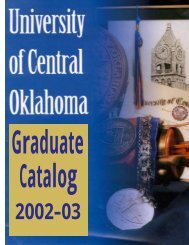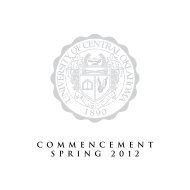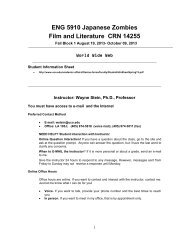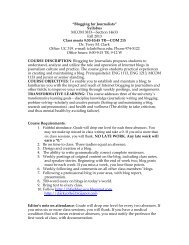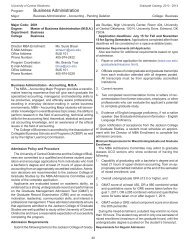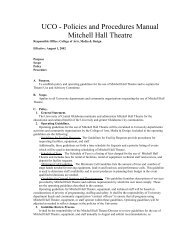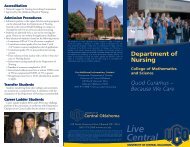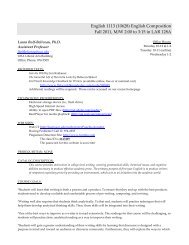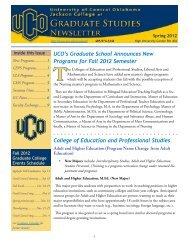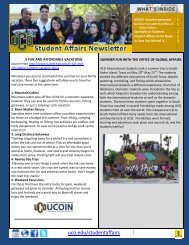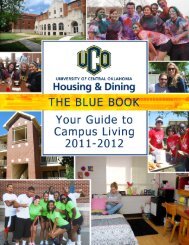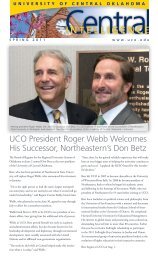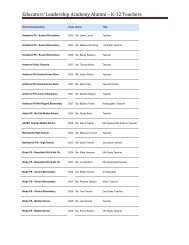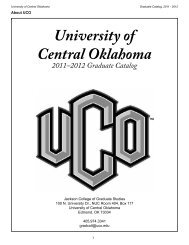Graduate Catalog - University of Central Oklahoma
Graduate Catalog - University of Central Oklahoma
Graduate Catalog - University of Central Oklahoma
Create successful ePaper yourself
Turn your PDF publications into a flip-book with our unique Google optimized e-Paper software.
<strong>University</strong> <strong>of</strong> <strong>Central</strong> <strong>Oklahoma</strong><br />
<strong>Graduate</strong> <strong>Catalog</strong>, 2012 - 2013<br />
<strong>Graduate</strong> Course Descriptions<br />
GERMAN (GERM)<br />
Department <strong>of</strong> Modern Languages, Literature &<br />
Cultural Studies<br />
GERM 5000 - Workshop In German<br />
Credit will vary from 1 to 4 hours. Subject matter will vary within the<br />
department’s field <strong>of</strong> study. Normally involves lecture, films, guest<br />
speaker, etc. A grade <strong>of</strong> “P” or “F” is given. No more than 2 hours <strong>of</strong><br />
workshop may be counted on a master’s degree.<br />
GERM 5203 - German Culture & Civilization<br />
Prerequisite(s): Eighteen hours <strong>of</strong> German.<br />
GERM 5223 - Advanced German Grammar<br />
Prerequisite(s): Eighteen hours <strong>of</strong> German.<br />
GERM 5313 - Joh W Von Goethe<br />
Goethe (1749-1832) shaped the German language and the German<br />
cultural landscape like no other author. Students will read several <strong>of</strong><br />
Goethe’s works and analyze them in the context <strong>of</strong> seminar discussions,<br />
exams and a paper. An essential component <strong>of</strong> this course is<br />
the interrogation <strong>of</strong> the concept ‘authorship’ in light <strong>of</strong> the many different<br />
Goethean artifacts that are not merely “literary”. Prerequisite(s):<br />
17 hours <strong>of</strong> German course work.<br />
GERM 5900 - Practicum In German<br />
Credit will vary from 1 to 4 hours. Subject matter will vary within the<br />
department’s field <strong>of</strong> study.<br />
GERM 5910 - Seminar / Special Topics<br />
Credit will vary from 1 to 4 hours. Subject matter will vary within the<br />
department’s field <strong>of</strong> study. May be repeated for credit up to four<br />
hours. Prerequisite(s): Eighteen hours <strong>of</strong> German, and permission<br />
<strong>of</strong> instructor.<br />
GERM 5930 - Individual Study In German<br />
Credit will vary from 1 to 4 hours. Subject matter will vary within the<br />
department’s field <strong>of</strong> study. May be repeated for credit up to four<br />
hours. Prerequisite(s): Eighteen hours <strong>of</strong> German, and permission<br />
<strong>of</strong> instructor.<br />
GERM 5950 - Internship In German<br />
Credit will vary from 1 to 8 hours. Subject matter will vary within the<br />
department’s field <strong>of</strong> study. Supervised practical experience gained<br />
in a pr<strong>of</strong>essional field by an advanced or graduate student.<br />
GERM 5960 - Institute In German<br />
Credit will vary from 1 to 8 hours. Subject matter will vary within the<br />
department’s field <strong>of</strong> study.<br />
GERM 5970 - Study Tour<br />
Credit will vary. Subject matter will vary within the department’s field<br />
<strong>of</strong> study.<br />
GERM 5990 - Thesis<br />
Credit will vary from 1 to 6 hours. Subject matter will vary within the<br />
department’s field <strong>of</strong> study.<br />
GERONTOLOGY (GERO)<br />
Department <strong>of</strong> Sociology & Substance Abuse<br />
Studies<br />
GERO 5000 - Workshop<br />
Credit will vary from 1 to 2 hours. Subject matter will vary within the<br />
department’s field <strong>of</strong> study. Normally involves lecture, films, guest<br />
speaker, etc. A grade <strong>of</strong> “P” or “F” is given. No more than 2 hours <strong>of</strong><br />
workshop may be counted on a master’s degree.<br />
GERO 5023 - Orientation to Gerontology<br />
The purpose <strong>of</strong> this course is to present a broad overview <strong>of</strong> the<br />
major concepts and issues relevant to gerontology. These will include<br />
theories <strong>of</strong> aging, health and physiological aspects <strong>of</strong> aging,<br />
environmental design and retirement housing, leisure and recreation.<br />
GERO 5213 - Health & Social Services For Seniors<br />
This course focuses on health and social services available to<br />
seniors in the United States providing in- depth understanding <strong>of</strong><br />
Medicare, Medicaid, Aging Network Services, housing, and private<br />
sector services.<br />
GERO 5342 - Politics <strong>of</strong> Aging<br />
This course focuses on a range <strong>of</strong> political and policy issues that affect<br />
the well-being <strong>of</strong> seniors and the political realities <strong>of</strong> developing<br />
solutions to these needs and concerns.<br />
GERO 5363 - Psychology <strong>of</strong> Aging<br />
This course examines the psychological aspects <strong>of</strong> human aging.<br />
Focus areas include, psychological theories <strong>of</strong> aging, psychological<br />
research methods in aging field, dementias/psychopathologies <strong>of</strong><br />
aging, and sensory, motor, and cognitive changes with aging.<br />
GERO 5443 - Biology <strong>of</strong> Human Aging<br />
The course examines the biological changes associated with human<br />
aging. Emphasis is given to theories <strong>of</strong> biological aging, maintenance<br />
<strong>of</strong> homeostatis, age changes in each body system, interactions among<br />
these systems, and diseases that commonly affect older adults.<br />
GERO 5463 - Bereavement Counseling<br />
This course will discuss death and dying, the stages <strong>of</strong> grief, hospice,<br />
the living will and techniques to be used in counseling the bereaved<br />
<strong>of</strong> all ages.<br />
GERO 5523 - Qualitative Gerontology<br />
This course is an indepth study <strong>of</strong> qualitative research in Gerontology.<br />
Topics covered include methodological techniques, application<br />
<strong>of</strong> findings, and ethical considerations.<br />
GERO 5731 - Drug Issues for Older Adults<br />
This course will examine drug issues concerning older adults including<br />
prescription and over-the-counter drugs, problems encountered by<br />
the older adult taking multiple medications, substance abuse, health<br />
and safety guidelines, marketing effects, and economic concerns.<br />
GERO 5743 - Colloquium in Gerontology<br />
This course is designed to be the culminating experience for all<br />
gerontology majors. It will summarize all the work covered in the<br />
gerontology proram and look at directions for the future in the field<br />
<strong>of</strong> aging. Prerequisite(s): Course should be taken during students<br />
last spring semester prior to graduation.<br />
GERO 5900 - Practicum<br />
Credit will vary from 1 to 4 hours. Subject matter will vary within the<br />
department’s field <strong>of</strong> study.<br />
GERO 5910 - Seminar / Special Topics<br />
Credit will vary from 1 to 4 hours. Subject matter will vary within the<br />
department’s field <strong>of</strong> study.<br />
GERO 5920 - Directed Reading<br />
Credit will vary from 1 to 4 hours. Subject matter will vary within the<br />
department’s field <strong>of</strong> study.<br />
GERO 5930 - Individual Study<br />
Credit will vary from 1 to 4 hours. Subject matter will vary within the<br />
department’s field <strong>of</strong> study.<br />
227



